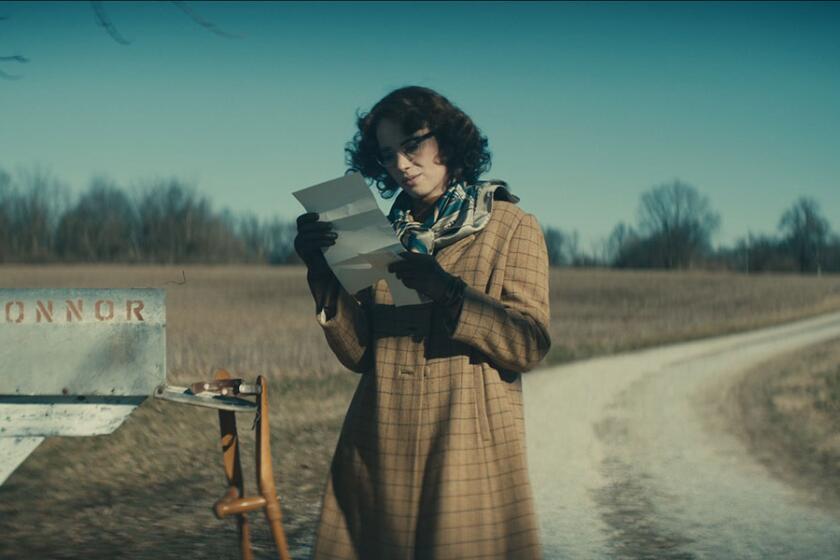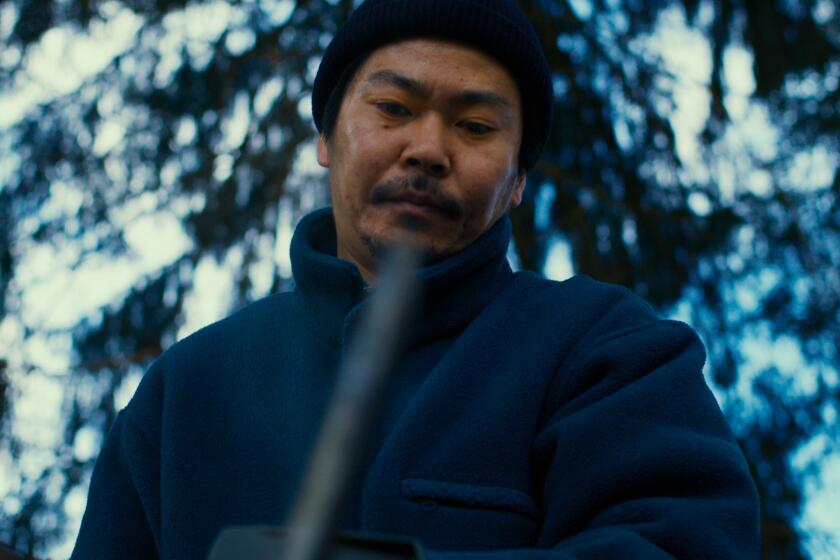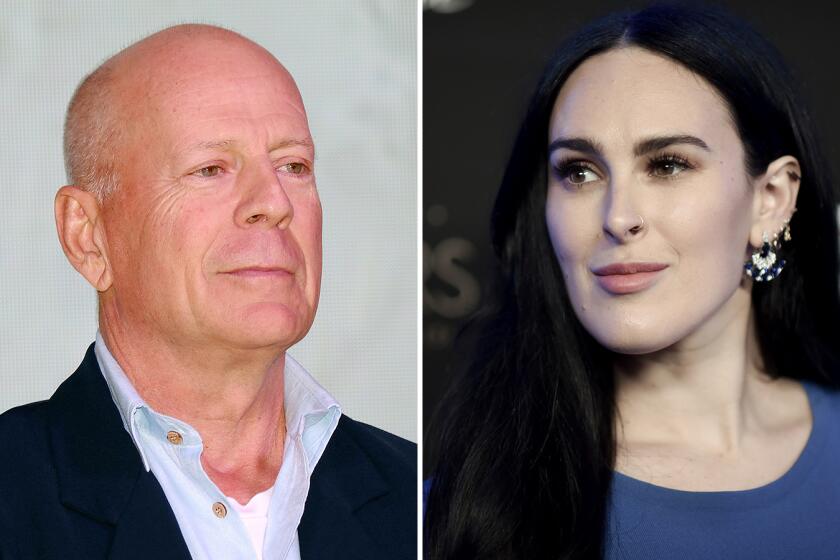Call him Kevin Kline, not ‘Kevin Decline’
It’s a rare individual who can pull off having three dictionary apps on his iPhone — one of which is in French, no less — and not seem like a dork. But Kevin Kline has made a career out of mining his contradictions. He has been lauded as “The American Olivier” for his Shakespeare performances yet brought home a rare Oscar for a comedic role; he’s been a leading man in big-budget films while embracing quirky characters in indies.
Kline’s latest turn is among the quirkiest of his career, starring in the $6.3-million “The Extra Man” alongside past costars Katie Holmes (“The Ice Storm”), John C. Reilly (“A Prairie Home Companion”) and Paul Dano (“The Emperor’s Club”). As Henry Harrison, a failed playwright, poseur and “walker” of wealthy women, the 62-year-old plays a character whose ideas on the opposite gender and society, it is suggested in an interview, aren’t necessarily endearing.
FOR THE RECORD:
Kevin Kline page number: A box with a photo on the Sunday Calendar cover referring readers to an article about actor Kevin Kline gives the wrong page. The article is on Page D4. —
“I love Henry!” Kline replies enthusiastically. “He’s ornery but he has such an indomitable spirit, a joie de vivre that carries him through. He feels the need to press on no matter what.” But beyond that, Kline is coy about what motivates Henry, a dapper gentleman whose rigid views on sex leave some among his acquaintances questioning his sexuality.
He’s a character with a big personality in a world populated by oddballs that not everyone will love. So what was the draw? “The script made me laugh and, as I said to my agent, ‘If this is done right, this is such an amazing character, with such a subtle story.’ It doesn’t have a happy ending where the characters change, but Henry becomes a little nicer and is capable of expressing a little more emotion.”
Dressed nattily in a gray suit, Kline is holding forth about his new film, which opens Friday in New York and Aug. 6 in Los Angeles, over high tea at Manhattan’s Carlyle Hotel. He appears every bit the self-assured and privileged Upper East Sider that the near-destitute Henry aspires to be, a trait not lost on the film’s co-directors, Shari Springer Berman and Robert Pulcini, who adapted the film from Jonathan Ames’ novel. “Kevin’s a snob, but in such a lovable way,” Pulcini says. “He’s constantly self-deprecating and yet self-aggrandizing at the same time, which is a hysterical combination. He fully embraces himself.”
“I probably have an oversized ego but I don’t let it show,” says the veteran actor, who offsets any possible pretension with a wry sense of humor. “I’m embarrassed by the unhealthy side of it.”
Ask him if he considered using his star power to, say, press the ever-hovering bondsman tasked with keeping the movie on schedule for a little extra shooting time, and he looks perplexed. “The thought never even occurred to me,” he says. “I think it is the fear of hearing, ‘Who do you think you are? John Travolta? Tom Cruise? Harrison Ford?’ And then I would have been unable to work, I would have been so depressed.”
The Juilliard-trained actor, who also studied music at Indiana University, has a resume that even those big stars might do well to study. Who else has so effortlessly moved from roles that called for modern hilarity (he earned his Oscar for 1988’s “A Fish Called Wanda”), classical humor (he costarred with Michelle Pfeiffer in the 1999 screen version of “A Midsummer Night’s Dream”), polished elegance (he played Cole Porter — and the piano — in the 2004 biopic “De-Lovely”) and burning instability (as in 1982’s “Sophie’s Choice”)? But Kline insists he’s not nearly as intelligent as he looks, at least in this regard. “My agent was always confused because when he would say, ‘It’s going to be a big commercial hit,’ I’d say, ‘So?’”
Responses like that helped earn Kline, who has two teenage children with wife Phoebe Cates, the industry nickname of Kevin Decline. “He never seems concerned about what his next job is going to be, and I wish he’d think about it more. Frankly, I think he’s too careful,” says Irwin Winkler, who directed the actor in “De-Lovely” and 2001’s “Life as a House” but has nevertheless been on the receiving end of Kline’s turndowns: “He’s said ‘no’ to me as much as anyone.”
The moniker makes Kline shudder at its suggestion of ingratitude. “In hindsight, it looks like I have called the shots but, in fact, there are longueurs, or gaps,” says the actor. “I went two years once between ‘Wild Wild West’ and whatever it was that came next.” (That would have been 2001’s “The Anniversary Party.”) “I just didn’t read anything that interested me and I was lucky that I could afford it,” he continues. “And during that time, I got better about having unstructured time.” He is fluent in French thanks to starring as a Parisian in 1995’s “French Kiss,” he practices the piano and he has embraced drawing and painting with a passion.
Still, Kline allows that he prefers to work. He makes comedies, he says, because they make him happy: “You check your self-consciousness at the door. Sometimes, you need to remind yourself not to get too unself-conscious. But I’m not easily embarrassed, and being silly means a whole lot of laughing. We ruined so many takes on ‘A Fish Called Wanda’ because someone would ad-lib and John Cleese would crack up.”
Then there is the inevitable pull back to the dark side. “I called my agent one day and said, ‘I’d like to do something bleak and depressing,’ and he called back and said, ‘I’ve found it! It’s the bleakest, darkest script I’ve ever read,’ and that was ‘The Ice Storm,’” the Ang Lee-directed tale of suburban moral malaise in the early ‘70s.
The one constant in Kline’s career is his sense of perfectionism. “This isn’t a man who goes to his trailer,” Winkler says. “On ‘De-Lovely,’ he would play Porter on the piano between scenes. On ‘Life as a House,’” in which Kline played an architect, “he built models.” Adds “Extra Man’s” Berman: “We were doing a scene where Kevin is carried up the steps because his back has gone out after a day at the beach and, of course, we shot out of sequence. There we were, with the bondsman making us sweat, and Kevin said, ‘I can’t do this scene without sand in my shoes! I’ve just come from the beach!’ So someone had to go to Central Park and get some sand from a playground. But it’s always about the movie and his role, and never about his personal ego or needs. And, somehow, he’s always right.”
Still, there have been missteps. It may not be a coincidence that Kline wasn’t reading scripts he loved immediately after “Wild Wild West,” which was critically drubbed (The Times’ Kenneth Turan called it “clumsy” and “disappointing”), but the actor insists he’s comfortable with his lack of power in determining the outcome of a film after he’s done his job: “If you want more than that, you have to be a director.” Of 2002’s “The Emperor’s Club,” in which he played an idealistic classics teacher at a prep school, he says, “It was based on Ethan Canin’s book, which had a great title, ‘The Palace Thief,’” Kline remembers. “But the studio said, ‘Oh, no, you can’t use that as a title. There’s no palace and there’s no thief.’ But ‘The Emperor’s Club’?” Kline rolls his eyes. “I chortled when that turned out to be the name of the escort service that Eliot Spitzer used. It’s a good name for an escort service. It’s not so good for a movie.”
He’s been pleased with his recent choices, which cater to both his silly and serious sides. He recently filmed a cameo in a new comedy by Ivan Reitman, with whom he worked on 1993’s “Dave.” “I like working with people I have a history with,” the actor says. “I’ve done five films with Lawrence Kasdan [‘French Kiss,’ ‘I Love You to Death,’ ‘Grand Canyon,’ ‘Silverado,’ ‘The Big Chill’], three with Michael Hoffman [‘The Emperor’s Club,’ ‘A Midsummer Night’s Dream,’ ‘Soapdish’], two with Dickie Attenborough [‘Chaplin,’ ‘Cry Freedom’] and two with Alan Pakula [‘Consenting Adults,’ ‘Sophie’s Choice’].”
He’s also had a critically acclaimed turn on Broadway with the lead in “Cyrano de Bergerac” opposite Jennifer Garner and stars next in the upcoming Robert Redford period picture “The Conspirator,” in which he plays Edwin Stanton, Abraham Lincoln’s secretary of war.
Indeed, despite Winkler’s concerns, Kline is sounding like a downright “yes” man these days. “There is so much I still have to learn, so many things I have to get better at,” Kline says. “And, yes, there are still so many things I want to do.”
More to Read
Only good movies
Get the Indie Focus newsletter, Mark Olsen's weekly guide to the world of cinema.
You may occasionally receive promotional content from the Los Angeles Times.






